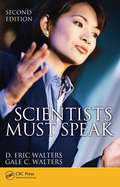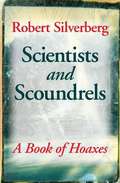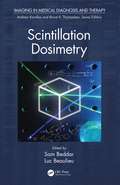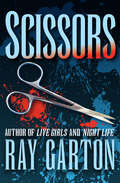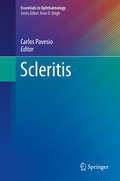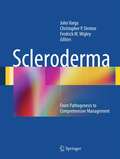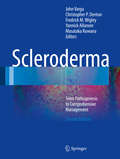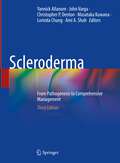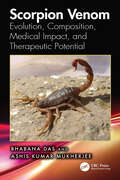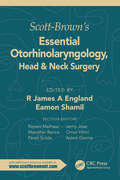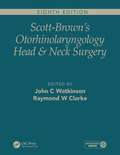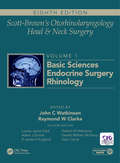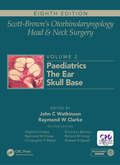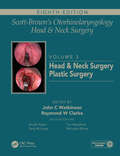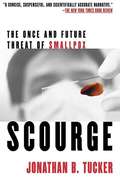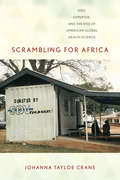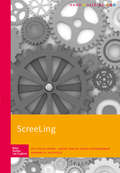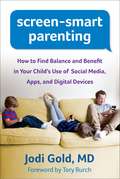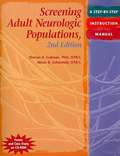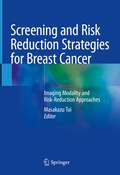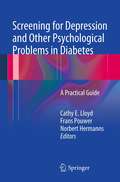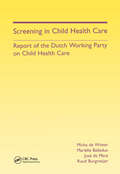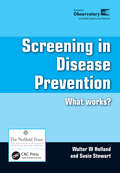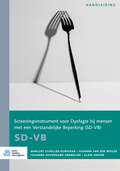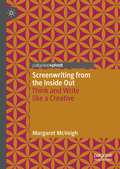- Table View
- List View
Scientists Must Speak
by D. Eric Walters Gale C. WaltersHaving the ability to speak confidently; engage the audience; make a clear, well-argued case; and handle any tricky situations, is rarely a natural talent, but it can be learned through application and practice. Scientists Must Speak, Second Edition, helps readers do just that.At some point in their careers, the majority of scientists have to stand
Scientists and Scoundrels: A Book of Hoaxes
by Robert SilverbergAs if history and nature had not provided wonders enough, through the ages humans themselves have contrived more marvels to deceive one another. Sometimes they have concocted evidence when none was available to prove pet theories; sometimes their intention has been to impress or defraud; sometimes they have acted merely for sport. Robert Silverberg tells the stories of a baker's dozen of these scientific hoaxers in a lively, good-humored book that ranges through time and across continents. Here are perpetual-motion machines and space rockets, men on the moon and serpents in the sea. The rogues' gallery is a varied one: Dr. Mesmer, who cast his hypnotic spell on eighteenth-century Paris; Charles Dawson, whose Piltdown Man challenged evolution; Dr. Cook, with his tale of "discovering" the North Pole; and many others. These are fascinating stories and more than just entertainment. The author explains the scientific background against which the hoaxes appeared and the detective work that led to their exposure. The schemers teach us to be alert, to challenge the evidence, and to appreciate the healthy skepticism that characterizes the scientific method.
Scintillation Dosimetry (Imaging in Medical Diagnosis and Therapy)
by Sam Beddar Luc BeaulieuScintillation Dosimetry delivers a comprehensive introduction to plastic scintillation dosimetry, covering everything from basic radiation dosimetry concepts to plastic scintillating fiber optics. Comprised of chapters authored by leading experts in the medical physics community, the book: Discusses a broad range of technical implementations, from point source dosimetry scaling to 3D-volumetric and 4D-scintillation dosimetry Addresses a wide scope of clinical applications, from machine quality assurance to small-field and in vivo dosimetry Examines related optical techniques, such as optically stimulated luminescence (OSL) or Čerenkov luminescence Thus, Scintillation Dosimetry provides an authoritative reference for detailed, state-of-the-art information on plastic scintillation dosimetry and its use in the field of radiation dosimetry.
Scissors
by Ray GartonWhen he was a boy, Stuart Mullond's mother held him down while his urologist Dr. Ferguson performed a medical procedure on him that was so traumatizing and humiliating that its painful memory stayed with him for decades. For his entire life, his nightmares have been haunted by the snick-snick-snick of the doctor's scissors.Now a divorced, unemployed adult with a troubled teenage son, Stuart is trying to hold his life together...when Dr. Ferguson suddenly shows up again. He's not confined to nightmares anymore. He's very real. And he is determined to perform that same horrible procedure on Stuart's son. But all these years later, Dr. Ferguson looks exactly as he did when Stuart was a boy. And he's kept his scissors nice and sharp ...Snick-snick-snick!
Scleritis
by Carlos PavesioThis book offers a concise but comprehensive overview of scleritis, with up-to-date information on all aspects, including diagnosis and treatment. Fundamental features of the pathogenesis of scleral inflammation are first discussed as a basis for understanding the therapeutic strategies. Detailed descriptions are then provided of clinical manifestations, the complications that can arise during the course of the disease process, and the best way to manage them. An individual chapter is devoted to infectious scleritis and its management, this being an uncommon but serious condition that may result not only in loss of vision but also in loss of the globe itself. The diagnostic approach to and various management options for scleritis are then discussed extensively, with coverage of local and systemic therapy and new strategies, including biologics. Apart from the potential impact on vision, inflammation of the sclera carries a risk of association with systemic diseases, some of which can prove fatal if not promptly recognized and managed. This book is designed to allow ophthalmologists to easily identify the condition and the signs indicative of a more severe problem. It will thereby assist in safe and effective management, and help in preserving vision and life.
Scleroderma
by Christopher P. Denton Fredrick M. Wigley John VargaThis essential resource presents the most up-to-date information on scleroderma. A clear and concise synthesis of current concepts in pathogenesis and modern approaches to management, this book is comprised of the authoritative work of international experts. With an integrated multidisciplinary approach to comprehensive care, this book is easily accessible for health care professionals in many fields. It is a valuable resource for rheumatologists, pulmonologists, cardiologists, gastroenterologists, nephrologists and all those involved in the care of scleroderma patients.
Scleroderma
by Christopher P. Denton Fredrick M. Wigley John Varga Masataka Kuwana Yannick AllanoreComprised of the authoritative work of international experts, this fully-updated second edition of Scleroderma builds upon the well-regarded approach in the first edition to provide integrated, concise, and up-to-date synthesis of current concepts of pathogenesis and modern approaches to management of systemic sclerosis (scleroderma). With a multidisciplinary approach to comprehensive care, this book is easily accessible for health care professionals in many fields. The new edition includes extensive updated material based on major developments in the field, with new chapters on personalized medicine, cancer complications, global perspectives on scleroderma, and more. It presents a succinct and thoughtful synthesis of current pathomechanistic concepts, providing a valuable reference tool for basic and translational investigators working in the field. Scleroderma: From Pathogenesis to Comprehensive Management serves as an essential, all-inclusive resource for rheumatologists, pulmonologists, cardiologists, gastroenterologists, nephrologists and all those involved in the care of scleroderma patients.
Scleroderma: From Pathogenesis to Comprehensive Management
by Christopher P. Denton John Varga Masataka Kuwana Yannick Allanore Lorinda Chung Ami A. ShahThis fully-updated third edition of Scleroderma: From Pathogenesis to Comprehensive Managementbuilds upon the well-regarded approach in the previous editions to provide integrated, concise, and up-to-date synthesis of current concepts of pathogenesis and modern approaches to management of systemic sclerosis (scleroderma). With a multidisciplinary approach to comprehensive care, this book is easily accessible for health care professionals in many fields. Comprised of the authoritative work of international experts, the new edition includes extensive updated material reflecting major developments in the field. It presents a succinct and thoughtful synthesis of current pathomechanistic concepts, providing a valuable reference tool for basic and translational investigators working in the field. Scleroderma: From Pathogenesis to Comprehensive Management serves as an essential, all-inclusive and fully up to date resource for rheumatologists, pulmonologists, cardiologists, gastroenterologists, nephrologists and all those involved in the care of scleroderma patients.
Scorpion Venom: Evolution, Medical Impact, and Therapeutic Potential
by Ashis Kumar Mukherjee Bhabana DasThis book provides a comprehensive overview of scorpion biology and the medical implications of their venoms. It presents the taxonomic classification, anatomy, morphology, and natural habitats of scorpions, detailing their reproductive processes. It further explores the chemical nature of scorpion venom, discussing its composition, toxicity, and physiological effects, as well as its varied functions and mechanisms of action on ion channels. The chapter also focuses on scorpionism, presenting comprehensive epidemiological data and clinical insights from across the globe and reviewing the origin, evolution, and intricate composition of scorpion venom, framing its functional complexity and evolutionary significance. The book also covers the preventative measures and current treatment strategies for scorpion envenomation. It also addresses the limitations of existing antivenom therapies and examines innovative approaches, including the use of pharmaceuticals to enhance treatment protocols. The final chapter provides the promising biomedical applications of scorpion venom toxins across various medical fields. It discusses the therapeutic potential of these toxins in treating a range of human diseases, from cancer and cardiovascular diseases to autoimmune disorders and diabetes. This book is intended for researchers, clinicians, and students of toxicology, pharmacology, and arachnology.
Scott-Brown's Essential Otorhinolaryngology, Head & Neck Surgery
by R James A England Rajeev MathewA portable handbook that provides a concise summary of ENT surgery based on Scott-Brown’s Otorhinolaryngology, Head & Neck Surgery 8e. Of practical use in clinics, the ward and the operating room, this evidence -based resource provides easy access to information on clinical presentation, investigation, and the medical / surgical management of common and emergency ENT conditions.
Scott-Brown's Otorhinolaryngology and Head and Neck Surgery, Eighth Edition: Volume 3: Head And Neck Surgery, Plastic Surgery
by John C Watkinson Ray W ClarkeScott-Brown's Otorhinolaryngology is used the world over as the definitive reference for trainee ENT surgeons, audiologists and trainee head and neck surgeons, as well as specialists who need detailed, reliable and authoritative information on all aspects of ear, nose and throat disease and treatment. Key points: accompanied by a fully searchable electronic edition, making it more accessible, containing the same content as the print edition, with operative videos and references linked to Medline highly illustrated in colour throughout to aid understanding updated by an international team of editors and contributors evidence-based guidelines will help you in your clinical practice features include key points, best clinical practice guidelines, details of the search strategies used to prepare the material and suggestions for future research new Endocrine section.Scott-Brown will provide trainee surgeons (ENT and Head and Neck), audiologists and ENT physicians with quick access to relevant information about clinical conditions, and provide them with a starting point for further research. The accompanying electronic edition, enhanced with operative videos, will enable both easy reference and accessibility on the move.
Scott-Brown's Otorhinolaryngology and Head and Neck Surgery: Volume 1: Basic Sciences, Endocrine Surgery, Rhinology
by John C Watkinson Ray W ClarkeAvailable as a single volume and as part of the three volume set, Volume One of Scott-Brown's Otorhinolaryngology, Head and Neck Surgery 8e covers Basic Sciences, Endocrine Surgery, and Rhinology. <P><P>With over 100 chapters and complemented by clear illustrations, the content focuses on evidence-based practice. Clinical coverage is further enhanced by a clear well designed colour page format to ensure easy learning and the esy assimilation of the most up to date material. <P><P>Definitive coverage in a single volume, with e-version access included.
Scott-Brown's Otorhinolaryngology and Head and Neck Surgery: Volume 2: Paediatrics, The Ear, and Skull Base Surgery
by John C Watkinson Ray W ClarkeThis second volume in the Scott-Brown Otorhinolaryngology Head and Neck Surgery 8e three volume work is available either as in individual volume covering the sub specialties of Paediatrics, The Ear, and Skull Base Surgery, or as part of the classic three volume set. <P><P>With over 100 chapters and numerous illustrations, this specialist volume contains authoritative and cutting edge information from some of the world's outstanding clinicians. It will be a constant companion through the specialty training years and beyond.
Scott-Brown's Otorhinolaryngology and Head and Neck Surgery: Volume 3: Head and Neck Surgery, Plastic Surgery
by John C Watkinson Ray W ClarkeThis third volume in Scott-Brown's Otorhinolaryngology 8e covers the sub specialty areas of Head and Neck Surgery, and Plastic Surgery. It is available either as a single volume specialty reference book, or as part of the classic and authoritative 3 volume " Scott-Brown" set. Edited by renowned experts, and including chapter contributions from leading clinicians, Volume 3 Head and Neck and Plastic Surgery is current, authoritative, and of wide clinical application.
Scourge: The Once and Future Threat of Smallpox
by Jonathan B. TuckerJonathan B. Tucker traces the history of the smallpox virus from its first recorded outbreak around 3700 B.C. through its use as the first biological warfare agent in human history, and draws some decisively important lessons for the future. In a timely debate, Tucker addresses the ever-growing concerns about the proliferation of the deadly smallpox virus and its use by terrorist organizations. Explaining how the eradication of the disease in the late 1970s encouraged military research and production of the virus, he exposes the failure of the Russian government to secure its remaining cold-war stockpiles, and evaluates the past and present measures undertaken by the United States to counter the existing dangers of a smallpox attack. Ultimately, he passionately argues for the strengthening of the existing legal ban on the development and possession of biological weapons.
Scrambling For Africa: AIDS, Expertise, and the Rise of American Global Health Science (Expertise: Cultures and Technologies of Knowledge)
by Johanna Tayloe CraneCountries in sub-Saharan Africa were once dismissed by Western experts as being too poor and chaotic to benefit from the antiretroviral drugs that transformed the AIDS epidemic in the United States and Europe. Today, however, the region is courted by some of the most prestigious research universities in the world as they search for resource-poor hospitals in which to base their international HIV research and global health programs. In Scrambling for Africa, Johanna Tayloe Crane reveals how, in the space of merely a decade, Africa went from being a continent largely excluded from advancements in HIV medicine to an area of central concern and knowledge production within the increasingly popular field of global health science. Drawing on research conducted in the U. S. and Uganda during the mid-2000s, Crane provides a fascinating ethnographic account of the transnational flow of knowledge, politics, and research money as well as blood samples, viruses, and drugs. She takes readers to underfunded Ugandan HIV clinics as well as to laboratories and conference rooms in wealthy American cities like San Francisco and Seattle where American and Ugandan experts struggle to forge shared knowledge about the AIDS epidemic. The resulting uncomfortable mix of preventable suffering, humanitarian sentiment, and scientific ambition shows how global health research partnerships may paradoxically benefit from the very inequalities they aspire to redress. A work of outstanding interdisciplinary scholarship, Scrambling for Africa will be of interest to audiences in anthropology, science and technology studies, African studies, and the medical humanities.
ScreeLing: handleiding
by Evy Visch-Brink M. van de Sandt-Koenderman Hanane HachiouiDoel van de testMet de ScreeLing is screent men in korte tijd op afatische stoornissen op de linguïstische niveaus semantiek (woordbetekenis), fonologie (klankherkenning) en syntaxis (zinsstructuur). Het unieke van de ScreeLing is dat deze taalverwerkingsniveaus in één test verenigd zijn. Nog belangrijker is dat de ScreeLing al in de eerste week na een beroerte of een hersentrauma kan worden afgenomen. Door in een vroeg stadium de ScreeLing af te nemen, kan snel met gerichte therapie (bijvoorbeeld cognitief-linguïstische therapie) worden gestart. Zo wordt ingespeeld op het natuurlijke herstel van de neurale circuits die verantwoordelijk zijn voor de semantische, fonologische en/of syntactische taalverwerking. Het resultaat van de therapie verbetert daarmee. Daarnaast helpt vroegtijdig inzicht in het linguïstische patroon van de afatische stoornis patiënten en hun familie om beter om te gaan met moeilijke communicatieve situaties. In de eerste drie maanden na het ontstaan van het hersenletsel kan de ScreeLing worden gebruikt om herstelpatronen vast te stellen, al dan niet in samenhang met gegeven therapie. Ook in het chronische stadium van de afasie kan de Screeling worden ingezet om snel een globaal beeld te krijgen van de aangetaste linguïstische niveaus.Toepassing• Screening: stelt stoornissen vast in de linguïstische niveaus semantiek, fonologie en syntaxis• Diagnostiek: geeft een eerste indicatie van de afatische stoornis, waarna de afasie uitgebreider kan worden onderzocht.• Behandeling: geeft een indicatie voor de te kiezen therapie• Evaluatie: brengt herstelpatronen in kaart en het effect van therapie.Wat meet de ScreeLing?De ScreeLing meet het functioneren van afatici op het gebied van de semantiek, fonologie en syntaxis. Voor een zo specifiek mogelijke diagnostiek zijn deze hoofdschalen steeds onderverdeeld in 4 subschalen (diagnostische taken) die de essentie weergeven van de taalverwerking op de drie gebieden.• Semantiek: 1. matchen woord/afbeelding 2. beoordeling semantisch goede en foute zinnen 3. woordassociatie 4. categoriseren (‘odd word out’)• Fonologie: 1. nazeggen 2. hardop lezen 3. foneemgelijkenis 4. foneemanalyse• Syntaxis: 1. matchen woord of zin met afbeelding 2. wie/wat/waar-vragen 3. beoordeling syntactisch goede en foute zinnen 4. invullen functiewoordenVoor wie?De ScreeLing wordt afgenomen door logopedisten en klinisch linguïsten. De test kan ook worden afgenomen door andere professionals met affiniteit voor afasie en taal, zoals neuropsychologen, klinisch psychologen of neurologen. Afname en scoringDe afnametijd van de ScreeLing is gemiddeld 30 minuten. In totaal bevat de ScreeLing 72 items. De test is aan het bed afneembaar.Belangrijk: u kunt deze test alleen afnemen indien u over de Screeling complete set beschikt. NormenVoor de interpretatie worden cut off-scores gehanteerd. Deze geven aan of zich in de linguïstische niveaus stoornissen voordoen en in welke mate. Materiaal• ScreeLing- complete set • ScreeLing- scoreformulieren (set van 25)• ScreeLing -handleiding
Screen-Smart Parenting
by Tory Burch Jodi GoldAs a practicing child psychiatrist and mother of three, Jodi Gold has a unique understanding of both the mind-boggling benefits and the serious downsides of technology. Dr. Gold weaves together scientific knowledge and everyday practical advice to help you foster your child's healthy relationship to technology, from birth to the teen years. You'll learn: *How much screen time is too much at different ages. *What your kids and teens are actually doing in all those hours online. *How technology affects social, emotional, and cognitive development. *Which apps and games build smarts and let creativity shine. *How your own media habits influence your children. *What you need to know about privacy concerns, cyberbullying, and other dangers. *Ways to set limits that the whole family can live with.
Screening Adult Neurological Populations (2nd Edition): A Step-by-Step Instruction Manual
by Sharon A. Gutman Alison B. SchonfeldThis book is intended to be a functional and easy-to-understand instruction manual describing the most common screening methods for patients with neurological disorders. It is designed to allow therapists to easily identify possible impairment, document identified dysfunction, and determine if further in-depth evaluation is warranted.
Screening and Risk Reduction Strategies for Breast Cancer: Imaging Modality and Risk-Reduction Approaches
by Masakazu ToiThis book provides readers with the most up-to-date practical information on breast cancer screening. Since breast cancers are highly heterogeneous, time to clinical onset from the initial carcinogenesis differs diversely between cancers. Pathological germline variants and driver mutations cause a high lifetime risk of breast cancer. The lifetime risks are various according to what genes are pathologically dysfunctional. Integrated omics and imaging technologies have established varying tumour characteristics. Thus, this book suggests that a more individualised scheme is required to improve breast cancer screening. A key aim is to demonstrate how multiple diagnostic imaging modalities such as mammography, ultrasonography, MRI, PET and dbPET improve breast cancer screening accuracy. Mammography screening alone may have a limited impact on breast cancer risk prediction. These issues are crucial to discuss. Clinical experts recommend that new modalities be incorporated for women with dense breasts, like ultrasonography, dynamic mammography, MRI and maybe breast-dedicated PET. Topics on these modalities are going to be summarized in this book. An in-depth review of these modalities is summarised in this book. In addition, new diagnostic modalities, including risk assessment tools, multi-cancer early detection tests using liquid biopsy, the role of protein biomarkers in breast cancer risk screening, challenges, and hopes for future advances, are also covered in this book.
Screening for Depression and Other Psychological Problems in Diabetes
by Cathy E. Lloyd Frans Pouwer Norbert HermannsThis book is divided into two main sections, and covers a broad range of issues important for health practitioners to be aware of when caring for people with co-morbid diabetes and depression. Section One of the book contains the overall ideas and the more recent developments in measuring psychological morbidity in people with diabetes. When attempting to identify people with depression or other psychological problems, it is important for practitioners to recognize the limitations of screening as well as its utility. Issues such as the basic principles regarding when and when not to screen, the cultural applicability of tools, different questionnaire formats and key concepts such as sensitivity and specificity of tools, and their positive and negative predictive value, will be considered. In particular there has been increased interest in the concept of diabetes-related distress and several tools have been developed to measure this. There are broad-based measures of distress such as the Problem Areas in Diabetes (PAID) scale, the Diabetes Adjustment Scale (DAS), The Diabetes Health Profile, The Fear of Hypoglycemia Scale, etc. There are also a range of generic quality of life tools which have been used effectively in people with diabetes; for example the Medical Outcomes Survey Short-Forms (SF36, SF12), the World Health Organisation Well-being questionnaire (WHO-5) and the EQ5-D. These tools are important because they measure aspects of psychological well-being that are specifically associated with the experience of having a long-term conditions and so have important implications for both self-care and health care practice. The potential overlap of symptoms of depression and symptoms of diabetes-related distress are considered in this section and the implications for practice discussed. Section Two covers the most commonly used tools that have been used to screen for depression. For each tool considered some information which is easily referred to by the readeris set out in a table which includes details of the authors, time of first use, country where it was first developed, some examples of the questions used, the languages it is available in, data on sensitivity/specificity. Each instrument will then be discussed in terms of its use in research as well as practice, and its applicability in different patient groups, different cultural settings and so on. Guidance on the practical use of each tool is included, and the most popular depression screening tools are focussed on.
Screening in Child Health Care: Report of the Dutch Working Party on Child Health Care
by Micha De WinterChild surveillance is a subject of increasing scientific social and political debate in many countries of the world. In the UK protocols for effective action are based on a government report 'Health for all children'. The research which gave rise to these protocols has been developed further in the Netherlands and drawing on the experience of other health care systems has produced conclusions which challenge some widely-accepted assumptions about appropriate procedures. This book reviews the international research and recommendations of the Dutch working party. It presents an authoritative and practical survey of the contents and frequency of child health surveillance programmes procedures for quality control and improvement possibilities for parental involvement and the levels of expertise necessary to run programmes effectively. It offers a clear vision of a more sophisticated approach to child health care and is therefore an important reference for community paediatricians and others involved in the development of primary care.
Screening in Disease Prevention: What Works?
by Walter W Holland Susie StewartScreening for disease has become a widely accepted concept in health care. Screening in Disease Prevention takes a critical look at the practice of screening throughout the various stages of life. The book highlights three current challenges: the increasing consumer, media and commercial focus on health in general and screening in particular; providing accurate and understandable information; and tackling the continuing variation in the uptake of screening between different areas of the country and different socio-economic groups. Screening in Disease Prevention is important reading for public health professionals, particularly those involved in screening programs. Policy makers and shapers, medical researchers, pressure groups and support organizations for people with screenable conditions will also find it a valuable reference.
Screeningsinstrument voor Dysfagie bij mensen met een Verstandelijke beperking (SD-VB): Handleiding
by Marloes Schüller-Korevaar Susanna van der Woude Johanna Hovenkamp-Hermelink Alain DekkerDit screeningsinstrument helpt om een verhoogd risico op voedings- en slikproblemen (dysfagie) op te sporen bij mensen met een verstandelijke beperking. Het maakt daarvoor niet uit wat de oorzaak is van de beperking, of wat het niveau van de cliënten is. Met behulp van het screeningsinstrument voor dysfagie bij mensen met een verstandelijke beperking (SD-VB) wordt ondersignalering van dysfagie bij mensen met een verstandelijke beperking voorkomen. Een verhoogd risico op dysfagie wordt tijdig in kaart gebracht waardoor adequaat diagnostiek en behandelbeleid kan worden ingezet. Dit leidt tot verlaging van risico’s en verbetering van de kwaliteit van leven.Deze handleiding bevat naast de verantwoording van de ontwikkeling en gebruikersinstructies (afname, scoring, interpretatie) ook een beschrijving van het cyclische dysfagiewerkproces waarin het SD-VB idealiter wordt ingezet. Dit proces, beginnend bij het moment van screenen op verhoogd dysfagierisico tot enmet het uitvoeren en evalueren van het logopedisch behandelbeleid, is onmisbaar voor goede dysfagiescreening, -diagnostiek en -behandeling in de praktijk.Het SD-VB bestaat uit 29 ja/nee-vragen over eet- en drinkgedrag. Zorgverleners kunnen dit gemiddeld in vier minuten invullen. Ze hebben hiervoor geen cursus nodig. De interpretatie van de scores is voorbehouden aan logopedisten.Marloes Schüller-Korevaar en Susanna van der Woude zijn beiden logopedist-onderzoeker, Ans Hovenkamp-Hermelink is senior onderzoeker. Zij zijn werkzaam bij de afdeling Praktijkgericht Wetenschappelijk Onderzoek van Alliade, net als Alain Dekker die hoofd van deze afdeling is.
Screenwriting from the Inside Out: Think and Write like a Creative
by Margaret McVeighThis book provides aspiring screenwriters with a practical and informed way to learn how to think and write like a “creative”. It stands apart from, yet complements, other screenwriting “how to” books by connecting the transdisciplinary academic fields of screenwriting, film studies and cognitive psychology and neuroscience. Using a stepped approach, it shows the writer how to understand that how we think, shapes what we write, so that we may write better.
